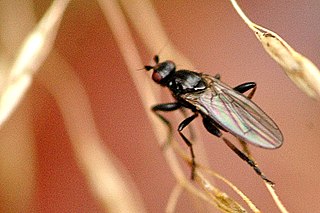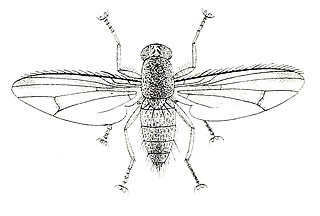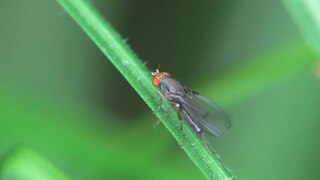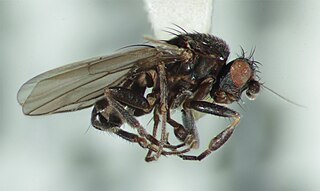
The Drosophilidae are a diverse, cosmopolitan family of flies, which includes species called fruit flies, although they are more accurately referred to as vinegar or pomace flies. Another distantly related family of flies, Tephritidae, are true fruit flies because they are frugivorous, and include apple maggot flies and many pests. The best known species of the Drosophilidae is Drosophila melanogaster, within the genus Drosophila, also called the "fruit fly." Drosophila melanogaster is used extensively for studies concerning genetics, development, physiology, ecology and behaviour. Many fundamental biological mechanisms were discovered first in D. melanogaster. The fruit fly is mostly composed of post-mitotic cells, has a very short lifespan, and shows gradual aging. As in other species, temperature influences the life history of the animal. Several genes have been identified that can be manipulated to extend the lifespan of these insects. Additionally, Drosophila subobscura, also within the genus Drosophila, has been reputed as a model organism for evolutionary-biological studies, along with D. sechellia for the evolution of host specialization on the toxic noni fruit and Scaptomyza flava for the evolution of herbivory and specialist on toxic mustard leaves.

Sphaeroceridae are a family of true flies in the order Diptera, often called small dung flies, lesser dung flies or lesser corpse flies due to their saprophagous habits. They belong to the typical fly suborder Brachycera as can be seen by their short antennae, and more precisely they are members of the section Schizophora. There are over 1,300 species and about 125 genera accepted as valid today, but new taxa are still being described.

The Curtotonidae or quasimodo flies are a small family of small grey to dark brown humpbacked flies (Diptera) with a worldwide distribution, but with very few species in the Nearctic, Australasian/Oceanian, and Palaearctic regions. Most members of the family are found in tropical to subtropical latitudes in Africa and the Neotropics. Many remain undescribed in collections, since little work on the family has been done since the 1930s.

Diastatidae are a family of flies, and are in the order Diptera. They occur primarily in the Holarctic Region, but several species are known from the Oriental, Neotropical, and Australasian regions. Members of the family number over 20 described species in three genera. There is an additional fossil genus.
Aulacigastridae is a very small family of flies known as sap flies. The family Stenomicridae used to be included within this family, but was moved by Papp in 1984. They are found in all the Ecoregions.

Chlorops is a genus of fly in the family Chloropidae.

Diastata is a genus of flies, and are in the family Diastatidae.
Copromyzinae is a subfamily of flies belonging to the family Lesser Dung flies.

Copromyza is a genus of flies belonging to the family lesser dung flies.

Crumomyia is a genus of flies belonging to the family lesser dung flies (Sphaeroceridae).
Norrbomia is a genus of flies belonging to the family lesser dung flies.
Ischiolepta is a genus of flies belonging to the family lesser dung flies.

Limosininae is a subfamily of flies belonging to the family Sphaeroceridae, the lesser dung flies.
Ceroptera is a genus of flies belonging to the family of the Lesser Dung flies.
Chaetopodella is a genus of flies belonging to the family Sphaeroceridae, the lesser dung flies.

Spelobia is a genus of flies belonging to the family of the Lesser Dung flies.
Telomerina is a genus of flies belonging to the family Lesser Dung flies.

Chloropinae is a subfamily of grass flies in the family Chloropidae.

Scoliocentra is a genus of flies in the family Heleomyzidae. There are at least 40 described species in Scoliocentra.











